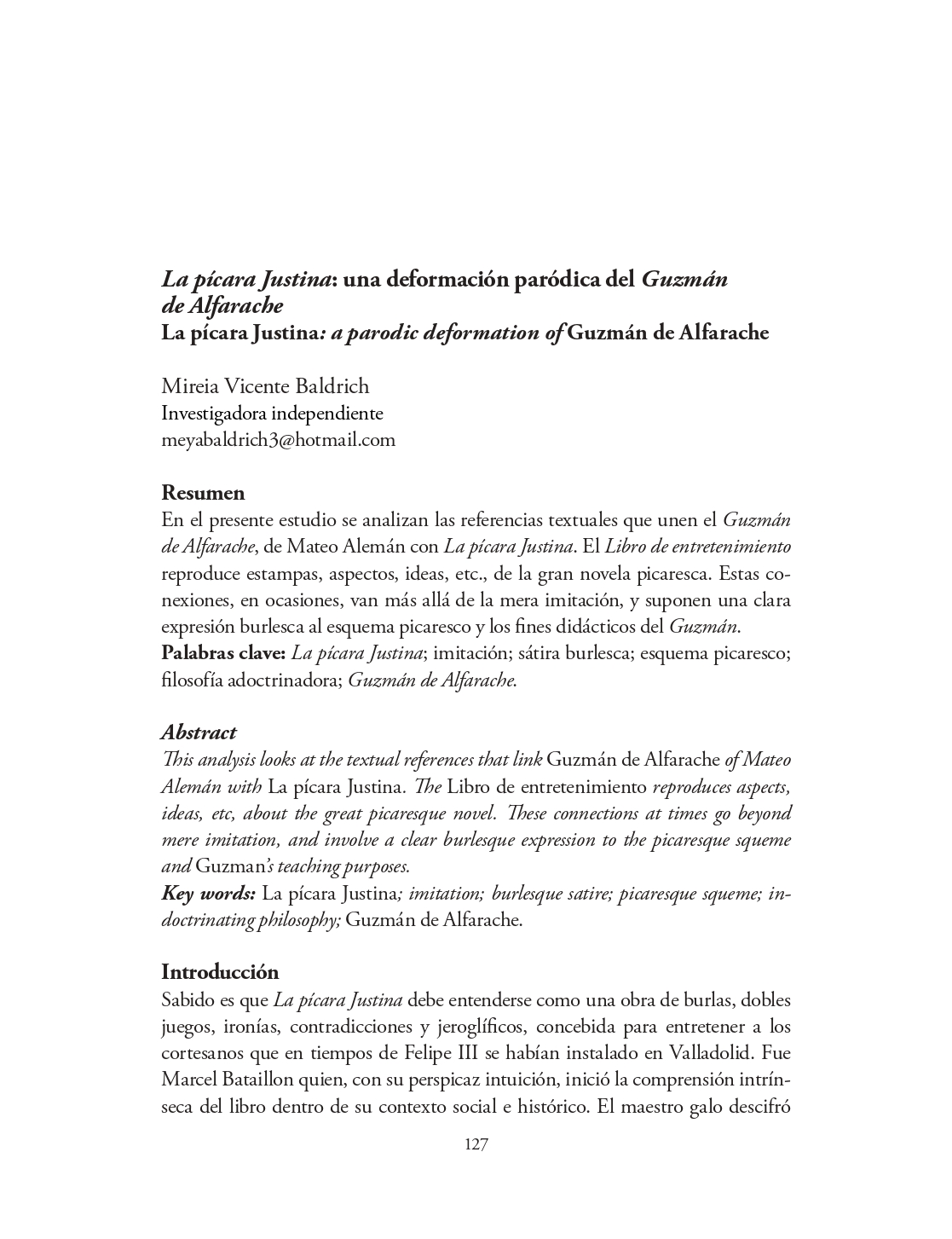
Keywords
La pícara Justina
imitation
burlesque satir
picaresque squeme
indoctrinating philosophy
imitation
burlesque satir
picaresque squeme
indoctrinating philosophy
How to Cite
‘La pícara Justina’: a parodic deformation of Guzmán de Alfarache. (2025). Diseminaciones, 2(4), 127-142. https://revistas.uaq.mx/index.php/diseminaciones/article/view/209
Abstract
This analysis looks at the textual references that link Guzmán de Alfarache of Mateo Alemán with La pícara Justina. The Libro de entretenimiento reproduces aspects, ideas, etc, about the great picaresque novel. These connections at times go beyond mere imitation, and involve a clear burlesque expression to the picaresque squeme and Guzman’s teaching purposes.

This work is licensed under a Creative Commons Attribution 4.0 International License.
Copyright (c) 2019 Diseminaciones
Similar Articles
- Mauricio del Olmo Colín, The difference between “literature” and “literary studies” , Diseminaciones: Vol. 1 No. 2 (2018)
- Araceli Alemán, Cognitive poetics: a field at the intersection , Diseminaciones: Vol. 2 No. 4 (2019)
- Adriana Álvarez Sánchez, Uses, readings and re-readings of indigenous language grammars: Esteban Torresano’s the manuscript of Arte of cakchiquel (1754) , Diseminaciones: Vol. 4 No. 7 (2021)
- Alexánder Sánchez Mora, The celebration of holiness in the kingdon of Guatemala: the mercedarian poetic fair in honor of San Pedro Pascual de Valencia (1673) , Diseminaciones: Vol. 4 No. 7 (2021)
- Maximiliano Crespi, Maurice Merleau-Ponty: A decapitated dialectic , Diseminaciones: Vol. 1 No. 2 (2018)
- Alejandro Villamor Iglesias, A conceptual clarification about “On what there is” by Quine , Diseminaciones: Vol. 5 No. 10 (2022)
- Alejandro Fielbaum S., The interstices of liberalism. Theater and Peronism in Borges , Diseminaciones: Vol. 1 No. 1 (2018)
- Javier Eduardo González Guzmán, The marginalization of evil in western philosophical tradition. The augustinian conception of evil as regards to logocentrism , Diseminaciones: Vol. 7 No. 14 (2024)
- Yonathan Alexander Escobar-Arboleda, Eva Patricia Velásquez-Upegui, La estructura textual y narrativa de la denuncia en la América colonial: el caso de los documentos inquisitoriales hondureños (1659-1819) , Diseminaciones: Vol. 4 No. 7 (2021)
- Juan Manuel Tabío, Ansí fabló Omero. Some remarks on the reception of the Ilias Latina in Spanish Medieval Literature , Diseminaciones: Vol. 6 No. 12 (2023)
You may also start an advanced similarity search for this article.
Most read articles by the same author(s)
- Araceli Mendieta Ramírez, Saúl Alejandro García, Critical interculturality in the training of educators to make cultural stratifications visible , Diseminaciones: Vol. 6 No. 12 (2023)
- Juan Manuel Arriaga Benítez, Meaning construction in film , Diseminaciones: Vol. 2 No. 4 (2019)
- Roberto García Bonilla, Biography, history and writing on Amparo Dávila , Diseminaciones: Vol. 5 No. 9 (2022)
- Heriberto Antonio García, La genealogía como investigación histórica en Foucault , Diseminaciones: Vol. 1 No. 1 (2018)
- Edgar Martínez García, Zuzana Erdösová, Female Gender entering into the Mexican Albur: Transformations, Innovations, Strategies , Diseminaciones: Vol. 3 No. 5 (2020)
- Ángel Chávez Mancilla, ‘El burgués gentil hombre’. Un retrato de la lucha de clases en el siglo XVII , Diseminaciones: Vol. 1 No. 2 (2018)
- Brenda Morales Muñoz, Reflections on migration from Tell Me How It Ends: An Essay in Forty Questions, by Valeria Luiselli , Diseminaciones: Vol. 2 No. 3 (2019)
- Blanca Alejandra Velasco Pegueros, Being cochimí: ethnic identity of a people considered extinct , Diseminaciones: Vol. 6 No. 12 (2023)
- José Carlos Cabrejo Cobián, Buddhism, hinduism and mutation of slasher horror subgenre in Santa sangre by Alejandro Jodorowsky , Diseminaciones: Vol. 2 No. 4 (2019)
- David Loría Araujo, The Fat Body in the Works of Julieta García González, Liliana Blum and Marina Herrera , Diseminaciones: Vol. 3 No. 6 (2020)
